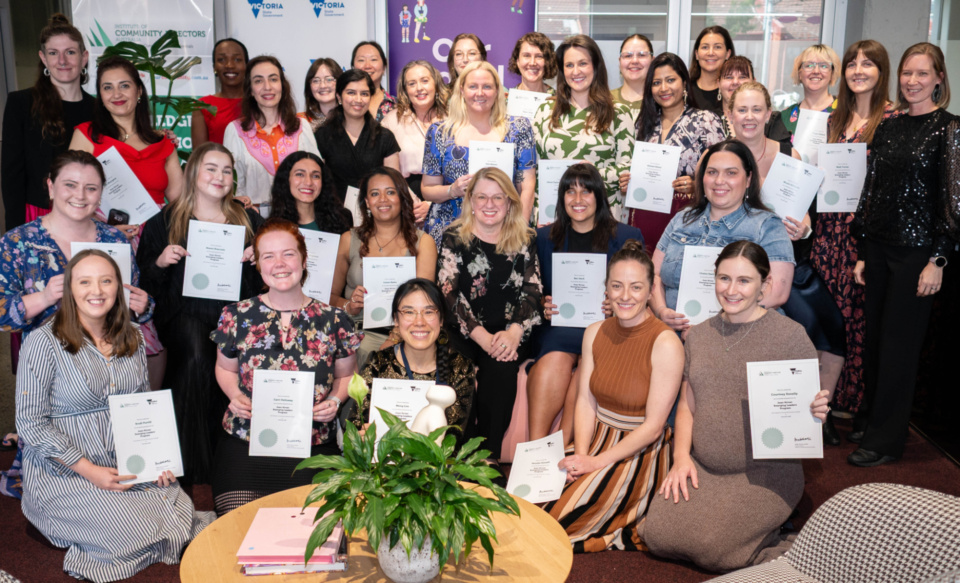
What not-for-profit leaders need to know in 2026
Posted on 12 Feb 2026
Our special NFP trends report distils the views of more than two dozen experts.
Posted on 18 Feb 2025
By Adele Stowe-Lindner

Not-for-profits have a responsibility and the capacity to strengthen civil society writes Adele Stowe-Lindner, executive director, Institute of Community Directors Australia.
As 2024 came to a close, I reflected on the recently published Not-for-Profit Sector Development Blueprint, which should result in some shifts in the sector in 2025 if its recommendations are adopted by organisations and governments.
The Blueprint is not a gift from the federal government to the sector. It's a wake-up call. The government needs to do some work to create enabling conditions, but the sector does not have to wait for that to happen in order to get going on many of the recommendations. Many of them can be implemented on a shoestring budget, given enough curiosity and commitment. In 2025, we at ICDA will be helping by supplying free training and resources to go with each of the initiatives recommended, so your organisation can be part of the change.
The Blueprint paints a picture of a healthy civil society and highlights the important role of NFPs in it, which makes sense. It is not possible or reasonable to expect a single government at a single point in time to be solely responsible for the health or disorder of civil society – particularly in Australia, where our federal terms are a maximum of just three years.
Even though the policy environment is critical in enabling the NFP sector to be agile, it is only one of the factors that affects the sector’s health – and arguably right now the sector is under the weather, showing symptoms of high stress levels, shortness of breath and chronic fatigue.
A lot of the responsibility for civil society rests squarely with us, the people, and the choices we make every day within our organisational frameworks and beyond. An example of what we can do on a shoestring in 2025 is to consider the language we use as individuals and organisations, the acknowledgements we give to people or not, the issues we push or don’t, the inclusivity or exclusivity of our efforts, the blind spots we pay attention to or don't. None of those things are government responsibilities, even though we would expect government to lead the way and model the behaviour we aspire to.
The new year offers the community sector in Australia a fresh opportunity to play a leadership role in demonstrating what we want our society to look like.
"The new year offers the community sector in Australia a fresh opportunity to play a leadership role in demonstrating what we want our society to look like."

The urgent need to enhance the sector’s digital literacy and data management skills has been recognised in the past year and the take-up of artificial intelligence (AI) is only quickening.
Much of the need for training involves AI – understanding its privacy implications far beyond the use of ChatGPT and Gemini, understanding how to automate systems and save time so as to increase competitiveness and impact.
AI can help NFPs analyse trends, predict demand for services and personalise fundraising, but training is essential to ensure ethical and privacy-conscious use. NFPs with strong data skills will be better placed to measure and report impact, which is critical for attracting donors, grants and government partnerships.
As AI and data skills become essential, NFPs in 2025 must ensure that staff and volunteers – particularly in under-resourced settings – are not left behind.
This month, Meta CEO Mark Zuckerberg's announcement that Meta is ending independent fact-checking will begin to take hold. Government regulation has not (yet) filled the gap, and so it becomes the community's responsibility to research the veracity of the information we imbibe; to put effort into accessing material from a variety of reliable sources and to avoid sharing stories that cause harm to others.
Misinformation and disinformation are not new scourges; we saw populism take hold last century, and propaganda from left and right – emotional manipulation and fake news – existed before the internet.
What this will look like in 2025 is anybody's guess, but we have the option in the powerful wave that social media has become to stand still and be swept up, or to dive under it and consider what we can do to change course (forgive me, I have just returned from a beach holiday in beautiful Western Australia.) There is no doubt that social media influenced democratic elections in 2024, and as Australia readies for its own federal election shortly, this is something to consider.
A year is made up of 12 short units of time, and one of those is already behind us.
As we savour each of the remaining months ahead, may we seek evidence to inform our chosen paths, may we be curious before we share opinions, may we demand that shades and complexity thrive in our discourse.
With these choices, in 2025 we can expect to see leaders from the smallest organisations and from the top levels of government speak with vision and conviction and create the inclusive, cohesive, innovative nation we can be.

Posted on 12 Feb 2026
Our special NFP trends report distils the views of more than two dozen experts.

Posted on 10 Feb 2026
As my family dropped our teenage son off at the airport in the first week of January to embark on a…

Posted on 11 Dec 2025
Community Directors trainer Jon Staley knows from first-hand experience the cost of ignoring…

Posted on 10 Dec 2025
As a qualified yoga instructor who learned the practice in her hometown of Mumbai, Ruhee Meghani…

Posted on 10 Dec 2025
Anyone working in an organisation knows it: meetings follow one after another at a frantic pace. On…

Posted on 10 Dec 2025
Stressed, overwhelmed, exhausted… if you’re on a not-for-profit board and these words sound…

Posted on 10 Dec 2025
The Institute of Community Directors Australia trains over 22,000 people each year, which gives us…

Posted on 03 Dec 2025
Many not-for-profit (NFP) board members in Australia are burnt out, overwhelmed and considering…

Posted on 26 Nov 2025
A roll call of Victoria’s brightest future leaders has graduated from a testing and inspiring…

Posted on 12 Nov 2025
At the Institute of Community Directors Australia, we believe that stronger communities make a…

Posted on 12 Nov 2025
Like many Community Directors members, Hazel Westbury is a community leader who isn’t easily…

Posted on 11 Nov 2025
I’ve seen what happens when fear of conflict wins out over taking a principled stand.